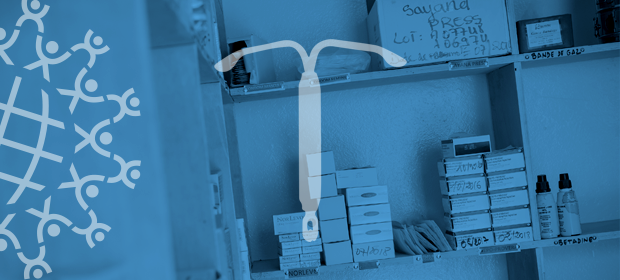Where We Work
See our interactive map


Health facilities in 22 districts have addressed a crucial shortage of health workers who are certified to provide IUDs. Image by IntraHealth International.
By repurposing unused surplus medical equipment, health facilities in Tanzania have addressed a crucial shortage of health workers who are certified to provide intrauterine contraceptive devices (IUDs) to clients in 22 districts throughout the country.
As part of the Tanzania Family Planning Outreach program, which is funded by the UK Department for International Development, IntraHealth International trained 300 public-sector health workers to deliver long-acting reversible contraceptives (LARCs) in 165 health facilities in 22 districts during 2014–2016. But during follow-up sessions of mentorship and supportive supervision, project staff found that only 27% (44) of those facilities had IUD insertion and removal kits in stock.
This meant that not only were clients at those facilities unable to choose IUDs as a contraceptive method, but also that 71% (212) of the health workers who’d been trained to provide IUDS could not demonstrate their skills to receive certification.
This low-cost innovation made LARCs more accessible to poor women in rural Tanzania.
An IntraHealth assessment also found, though, that the 165 health facilities had a surplus of unused equipment from maternity and delivery trays. In Tanzania, districts prioritize these delivery kits during medical equipment procurement processes, which often leads to a surplus of supplies. These supplies, project staff found, can be safely sterilized and reassembled into IUD kits by trained health facility staff.
In collaboration with the Ministry of Health Community Development, Gender Elderly and Children, IntraHealth trained all 22 district pharmacists and reproductive and child health coordinators to create the necessary kits from the existing supplies. These district pharmacists and coordinators then trained the 300 family planning providers to implement the approach.
All 300 trained health workers are now certified to provide IUDs. This low-cost programmatic innovation has made LARCs more available and accessible to poor women in rural Tanzania.
An analysis of this strategy combined with data from district health information system (DHIS2) reports found that:
IntraHealth’s Tanzania Family Planning Outreach program project is funded by the Department for International Development and carried out in partnership with PSI Tanzania and Restless Development. It works with the government of Tanzania to improve poor, rural women’s access to family planning services, comprehensive postabortion care, and services related to gender-based violence and violence against children, particularly for adolescent girls and survivors of gender-based violence in Tanzania.
Rose Kirimia Mtui, health systems strengthening advisor at IntraHealth International, contributed reporting for this story.



